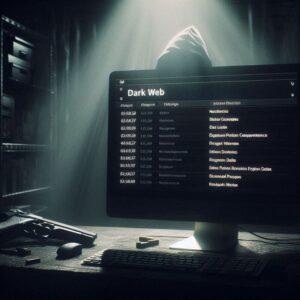Unlocking the Mysteries of Dark Web Investigations: An In-Depth Analysis
The Dark Web represents a complex and enigmatic portion of the internet that is not easily accessible through traditional search engines. To access this hidden domain, individuals must utilize specialized software, configure their settings uniquely, or obtain specific permissions, which adds to its intrigue and mystique. This shadowy area is marked by heightened levels of user anonymity and untraceability, making it a playground for various illicit activities. Frequently linked to illegal operations such as drug trafficking, arms dealing, and human trafficking, the Dark Web also acts as a hub for cybercriminals engaged in trading stolen personal information, credit card details, and other sensitive data. Within this obscure environment, users can engage in unlawful transactions, participate in restricted forums, and connect with communities that operate outside the bounds of legality, all while maintaining a facade of security against potential law enforcement scrutiny.
In contrast to the more familiar surface web, the Dark Web is constructed on a sophisticated framework that adeptly conceals users’ identities through advanced encryption technologies and multiple anonymity layers. Most individuals seeking to explore this hidden digital realm turn to specialized software such as Tor (The Onion Router), which anonymizes online activities by routing internet traffic through a network of volunteer-operated servers. This intricate routing system significantly complicates the efforts of anyone attempting to engage in network surveillance or traffic analysis, making it exceptionally difficult to trace a user’s location or online actions. While the Dark Web can offer a secure communication platform for whistleblowers and political activists, its notorious reputation largely stems from its association with criminal enterprises and illicit activities, creating formidable challenges for law enforcement agencies aiming to restore order.
Proven Strategies for Safely Navigating the Dark Web
- Recognizing that the Dark Web is a concealed segment of the internet requiring specific software for access, often related to illicit activities.
- Understanding that navigating the Dark Web involves significant risks, including identity theft, financial fraud, and exposure to explicit content that can have serious implications.
- DarkSearch is a crucial tool that empowers users to explore the Dark Web securely with its anonymous search engine capabilities designed to protect user privacy.
- Users may encounter a variety of illicit products and services, stolen data, black market activities, and even legitimate content while traversing the Dark Web.
- To ensure personal safety during Dark Web exploration, employing a secure VPN, being cautious with links, and managing personal data sharing are essential practices.
Assessing and Mitigating Risks Associated with Dark Web Activities
The Dark Web presents significant threats not only to individuals but also to society as a whole. It has become a major center for criminal activities, including the widespread sale of narcotics, firearms, and stolen personal information, which fuels the operations of various criminal organizations. This dangerous environment heightens the risk of identity theft, financial fraud, and other cybercrimes that can have devastating effects on unsuspecting users. The anonymity provided by the Dark Web complicates law enforcement’s ability to track and apprehend offenders, granting cybercriminals a false sense of security.
Furthermore, the Dark Web has a deeply troubling role in facilitating human trafficking and exploitation. Its unregulated and anonymous nature creates a haven for traffickers, leading to a disturbing increase in the online exploitation of vulnerable individuals, particularly young people who may be coerced into sex work or other modern forms of slavery. Additionally, the Dark Web often serves as fertile ground for extremist ideologies and terrorist propaganda, posing severe threats to national security and public safety. This reality emphasizes the urgent need for continuous vigilance and proactive measures from society to combat these pervasive dangers.
The overwhelming presence of illicit activities on the Dark Web carries profound societal implications. It fosters a culture of lawlessness that undermines efforts to create a safe online environment. Therefore, users must remain aware of the inherent risks linked to the Dark Web and take proactive measures to safeguard themselves against its potentially harmful consequences.

Expert Insights for Safely Navigating the Dark Web Using DarkSearch
DarkSearch represents a cutting-edge search engine specifically designed to empower users in exploring the Dark Web securely and privately. This advanced tool allows individuals to search for specific content without sacrificing their anonymity or personal privacy. DarkSearch employs robust encryption and privacy protections, ensuring that users can navigate the Dark Web without the persistent threat of being tracked or monitored by malicious entities.
One of the standout features of DarkSearch is its ability to provide users with a carefully curated selection of verified and reputable Dark Web websites. This functionality is vital for guiding users away from illegal or dangerous content, directing them toward trustworthy resources and information instead. Additionally, DarkSearch incorporates built-in security measures aimed at protecting users from fraudulent sites and phishing scams, significantly decreasing the likelihood of falling victim to cybercrime during their browsing activities.
Beyond enhancing security, DarkSearch opens the door to a wealth of information and resources that are usually inaccessible on the surface web. This includes niche forums, marketplaces, and communities focused on a wide variety of interests, enabling users to connect with like-minded individuals in a secure and private setting. By leveraging the capabilities of DarkSearch, users can responsibly navigate the complexities of the Dark Web, avoiding the pitfalls associated with illegal activities while still gaining access to valuable information and insights.

Diving into the Vast Array of Content on the Dark Web
The Dark Web encompasses an extensive range of content, showcasing both legitimate and illegal activities. Its infamous reputation predominantly arises from its role as a marketplace for illicit goods and services, including the trade of drugs, firearms, counterfeit currencies, and stolen personal data. This secretive environment is particularly appealing to criminals looking to conduct transactions while minimizing the chances of detection by law enforcement.
In addition to these illegal marketplaces, the Dark Web is home to forums and groups that engage in discussions across a myriad of topics such as hacking, cybercrime, political activism, and whistleblowing. These platforms provide individuals with a secure space to partake in controversial conversations and share insights without the fear of censorship or surveillance. However, they can also become breeding grounds for criminal behavior and extremist ideologies, posing significant threats to public safety and national security.
Despite its connections to illegal activities, the Dark Web performs critical functions. It offers a secure platform for whistleblowers and activists to disseminate vital information and shed light on issues of corruption and human rights abuses without incurring the risk of retaliation. Additionally, the Dark Web houses a wealth of resources and information that may be censored or unavailable on the surface web, making it an invaluable tool for those seeking uncensored knowledge and alternative perspectives.
Essential Safety Practices for Exploring the Dark Web
While exploring the Dark Web presents users with various risks, there are numerous strategies to protect against potential threats. Utilizing specialized software like Tor allows for secure browsing on the Dark Web. Tor encrypts internet traffic, effectively obscuring a user’s location and online activities from potential surveillance or traffic analysis, thus empowering users with enhanced privacy.
Exercising caution is critical during any Dark Web exploration. It is vital to avoid clicking on unfamiliar links or downloading unexpected files, as the Dark Web is replete with malicious sites designed to steal sensitive information or infect devices with harmful malware. Users can bolster their security by restricting their visits to trusted and verified websites while navigating this hidden digital landscape.
Moreover, individuals should refrain from sharing personal information or engaging in transactions on the Dark Web. The inherent anonymity of this environment complicates the verification process for merchants or buyers, which significantly elevates the risk of scams and fraudulent activities.
Employing a virtual private network (VPN) can greatly enhance security while navigating the Dark Web. A VPN encrypts internet traffic and masks a user’s IP address, making it increasingly difficult for malicious actors to trace or monitor online activities.
By adhering to these safety guidelines and remaining vigilant during Dark Web explorations, users can substantially reduce their exposure to potential threats and protect themselves from the myriad dangers associated with cybercrime.
Understanding Legal and Ethical Considerations When Using DarkSearch
When using DarkSearch or engaging with the Dark Web, individuals must be acutely aware of the legal and ethical implications involved. Accessing certain types of content or participating in specific activities on the Dark Web may violate local laws or ethical standards, potentially resulting in serious legal repercussions or moral dilemmas.
A crucial legal consideration when utilizing DarkSearch is the risk of encountering unlawful content or activities. Users must understand that accessing illegal marketplaces or engaging in criminal activities can lead to severe legal consequences, including prosecution and imprisonment. Therefore, it is vital to exercise caution and adhere to local laws while exploring the Dark Web to avoid unintentional violations.
Equally important is recognizing the ethical ramifications associated with using DarkSearch. Users should be mindful of the potential harms of engaging with harmful content or facilitating illegal actions on the Dark Web. This includes avoiding transactions involving illicit goods or services, steering clear of participating in criminal enterprises, and promptly reporting any illegal activities encountered during their exploration.
When accessing sensitive information or discussing controversial subjects on the Dark Web, it is essential to acknowledge the moral implications involved. Treating such matters with care and empathy is vital, as it recognizes the potential impact on individuals or communities affected by these issues.
By remaining vigilant and considering the legal and ethical factors while using DarkSearch, individuals can navigate the Dark Web responsibly and safely.

Envisioning Future Developments in the Dark Web: Innovations and Their Consequences
The future landscape of the Dark Web is on the brink of substantial advancements and implications that could significantly shape its trajectory. As technology continues to evolve, concerns regarding the potential for more sophisticated cybercriminal activities proliferating within the Dark Web are increasing. Innovations in encryption methodologies, anonymization technologies, and decentralized networks may further complicate law enforcement’s ability to monitor and regulate illegal activities in this hidden domain.
Moreover, the significance of international cooperation in addressing the challenges presented by the Dark Web cannot be overstated. Given that unlawful operations on the Dark Web often transcend national boundaries, the need for collaborative efforts among governments, law enforcement agencies, and technology firms is critically important. This includes sharing intelligence, coordinating responses, and establishing regulatory frameworks to mitigate the risks associated with the Dark Web, highlighting the essential roles played by each entity in tackling this global issue.
Additionally, ongoing discussions regarding potential government interventions aimed at combating illegal activities on the Dark Web while protecting individual privacy rights are gaining traction. Striking a balance between addressing cybercrime and safeguarding freedom of expression and internet privacy represents a complex challenge. As policymakers navigate these intricate considerations, they must prioritize informed decision-making to ensure that legislative measures effectively combat illegal activities on the Dark Web without infringing upon individual rights.
Future changes in the Dark Web will have profound implications for cybersecurity, law enforcement, personal privacy rights, and global security. By remaining informed about potential trends and shifts, individuals can better comprehend the evolving landscape of the Dark Web and take proactive measures to safeguard themselves against its associated threats.
Thorough Answers to Frequently Asked Questions About the Dark Web
What defines a Dark Web search engine, and how does it function?
A Dark Web search engine is specifically engineered to assist users in navigating the Dark Web, a concealed segment of the internet that conventional search engines do not index. This tool empowers individuals to uncover and access hidden websites and exclusive content that is typically unreachable through standard web browsers, thus enriching their exploration experience.
How do dark web search engines operate?
Dark web search engines utilize specialized algorithms to crawl and index content located within the hidden corners of the Dark Web. These engines access concealed websites and extract valuable information, making it searchable for users who wish to explore this hidden digital landscape in a more effective and efficient manner.
Is the use of a dark web search engine legal?
Utilizing a dark web search engine is not inherently illegal, as it merely serves as a tool for accessing content on the Dark Web. However, users must understand that the Dark Web is often associated with illegal activities, and engaging with certain content or participating in unlawful actions could lead to legal consequences.
What risks are associated with using a dark web search engine?
Several risks accompany the use of dark web search engines, including exposure to illegal and harmful content, potential malware infections, and the threat of being targeted by cybercriminals. Exercising caution and implementing appropriate security measures is essential when accessing the Dark Web to mitigate these risks.
Can I access the Dark Web without utilizing a dark web search engine?
Technically, it is possible to access the Dark Web without a search engine by using specialized software such as Tor, which allows users to browse anonymously and reach hidden websites. However, utilizing a dark web search engine can simplify the process of locating specific content and enhance navigation through the Dark Web.
References:
Pros and Cons of Internet Usage – Good and Bad Effects. https://thetechprint.com/pros-and-cons-of-internet-usage
Is it Illegal to Access the Dark Web? – Exploring the Dark Corners of the Digital World: A Tale of Mexican Hackers. https://www.hackersmexicanos.com/is-it-illegal-to-access-the-dark-web/
The post Deep Search: Unveiling the Invisible Dark Web appeared first on Ezi Gold.
The Article: Dark Web Exploration: Discovering the Hidden Internet Depths Was Found On https://ai.ezi.gold
The Article Dark Web Exploration: Unveiling the Hidden Internet Secrets Was Found On https://limitsofstrategy.com



Comments are closed